If you suffer from chronic headaches, you may have a TMJ disorder. Temporomandibular joint disorders (TMD) cause pain in the jaw joint and muscles. If you develop a tooth or gum infection, pain from your mouth can radiate to other areas of your face. Dr. Dhara Patel treats headaches in her Schaumburg area office to reduce painful symptoms of TMJ disorders, gum disease, and tooth decay. Headaches are a common issue connected to dental problems that we treat in Hoffman Estates, IL.

What Causes Temporomandibular Joint Disorders (TMJ)?
The causes of TMJ disorders vary, but some common causes may include:
- Teeth clenching and grinding
- Jaw misalignment
- Teeth or jaw injury
- Arthritis
- Poor posture
- Stress
TMJ disorders can manifest in multiple ways, varying from person to person. If you have any of these conditions, you may be more likely to develop a temporomandibular joint disorder than other patients.
Several common signs of TMJ disorders to look out for include:
- Earaches
- Jaw pain
- Headaches
- Teeth clenching and grinding
- Stiffness in jaw muscles
- Jaw locking
- Pain in the temple area
- Facial pain
You may have a TMJ disorder if you notice any of these signs. Call today at 847.660.6603 for comfortable and comprehensive TMJ treatment at Best Dental Spa.
Why Do Dental Infections Cause Headaches?
Untreated cavities, dental abscesses, or tooth decay can sometimes lead to headaches. You may have a headache because of an infection if you also have these symptoms:
- Throbbing on one side of the face
- Tooth pain
- Jaw aches
- Pain when eating
- Bleeding gums
- Bad breath
An infection can cause a headache when the pain and inflammation from the infection travel through the nerves. This pain can culminate in regular headaches. A tooth abscess, or pocket of pus, can also rupture, spreading throughout the face.
Treating Headaches in Hoffman Estates, IL
We can treat TMJ disorders with oral appliances. Before treatment, Dr. Patel will review your options with you and assess your teeth and gums to ensure that the chosen option aligns with your budget and goals. She will then take dental impressions to create the acrylic appliance.
Oral appliances are custom-made mouthguards that keep teeth from grinding together. Wearing them at night can protect teeth from further wear and tear.
Dr. Patel may recommend cosmetic treatment if you have excessive tooth damage or wear and tear from grinding your teeth due to a TMJ disorder.
Tooth bonding or dental crowns can repair damage and improve the aesthetics of your smile. We often recommend bonding for chipped or cracked teeth, while crowns act like caps to cover worn teeth. Covering damaged teeth creates a balanced bite and reduces TMJ symptoms.
In severe cases of TMJ that create reoccurring headaches, we may recommend restorative treatments such as dental implants. If you have one or more missing teeth, implants close gaps in your smile that contribute to a bad bite. Creating a balanced bite with implants can reduce your headaches.
Botox® for TMJ in Hoffman Estates
Dr. Patel may recommend Botox to treat muscle tension and signs of TMJ disorders. Botox has been proven to relieve treated muscles and allow jaw muscles to work more efficiently and without tension. The Botox injection helps relax the facial muscles, reducing the risk of teeth grinding and chronic headaches.
Dr. Patel may combine Botox with other treatment options, such as a mouthguard. She may also recommend relaxation techniques for a more comprehensive approach with better long-term results.
Treating Headaches from Infection
If we discover signs of a dental infection, we will create a treatment plan based on the extent of your symptoms. We will recommend a deep cleaning if you have gum disease. During this cleaning, we remove plaque and tartar from the gums and tooth roots.
If you have tooth decay, there are multiple options we may choose from. We recommend a filling if you have a small cavity in your infected tooth. In addition, a root canal is appropriate if your infection reaches the inside of your tooth.
We will take X-rays to determine which treatment you need. X-rays will help us see if you have infected nerves and blood vessels within your tooth. Then, we can provide the proper treatment.
Frequent Headaches FAQs
Read answers to common questions patients have about treating chronic headaches in our Hoffman Estates, IL office:
Can dental problems give you headaches?
Yes, dental issues may cause headaches and are a common cause. Toothaches may commonly trigger a headache in patients.
Additionally, if a toothache or cavity is left untreated, it may cause patients to get migraines frequently. An infection can trigger the facial nerves or pain that radiates to the neck, ear, and head.
Can a tooth infection go to your brain?
Although highly rare, a tooth infection may spread into the brain in the most severe cases over time. Tooth infections are serious and require treatment. They may cause migraines, contribute to compromised immune systems, and infect a patient’s bloodstream.
However, receiving professional treatment early on can reduce the risk of infection spreading throughout the body.
Can crooked teeth cause tension headaches?
Crooked or misaligned teeth may cause frequent headaches. These headaches will feel like there is excess built-up tension in your head. When teeth are misaligned, muscles overwork, and tension builds in the jaw and facial muscles, which may cause tension headaches.
How long does Botox treatment for TMJ last?
Botox for TMJ can provide relief from painful symptoms for up to 4 months. The effective length of time depends on the severity of your symptoms. We can also provide touch-ups to ensure long-lasting results.
Schedule a Dental Exam Today
If you have noticed that you suffer from chronic headaches or other common symptoms of TMJ disorders, call Best Dental Spa today at 847.660.6603. You can also request a dental appointment with Dr. Patel online.
Please let us know if you have more questions about headaches and dental care at your next visit. We’re here to help you understand the connection between your oral and physical health.
